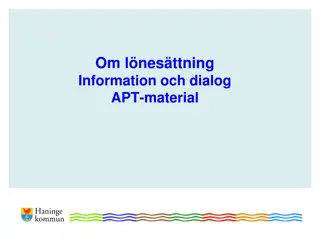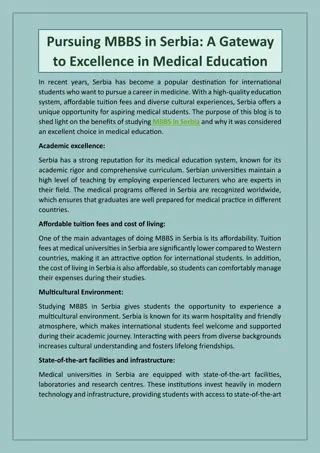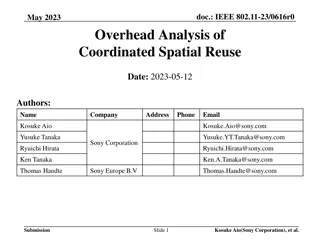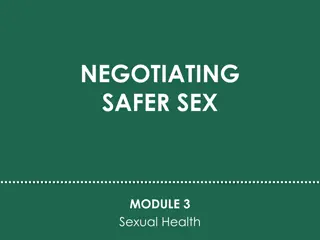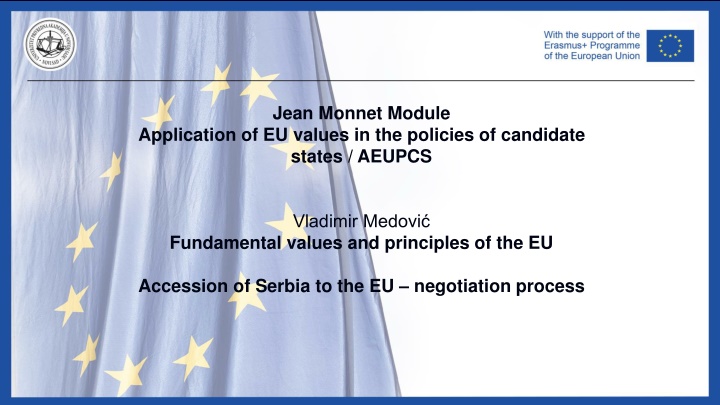
EU Accession Negotiations Process: Serbia and EU Values
Explore the process of Serbia's accession to the EU, focusing on the fundamental values, membership criteria, negotiation substance, and the new methodology adopted in February 2020. Learn about the principles, requirements, and chapters involved in the negotiation process, emphasizing the importance of respecting EU values and fulfilling criteria for successful accession.
Download Presentation

Please find below an Image/Link to download the presentation.
The content on the website is provided AS IS for your information and personal use only. It may not be sold, licensed, or shared on other websites without obtaining consent from the author. If you encounter any issues during the download, it is possible that the publisher has removed the file from their server.
You are allowed to download the files provided on this website for personal or commercial use, subject to the condition that they are used lawfully. All files are the property of their respective owners.
The content on the website is provided AS IS for your information and personal use only. It may not be sold, licensed, or shared on other websites without obtaining consent from the author.
E N D
Presentation Transcript
Jean Monnet Module Application of EU values in the policies of candidate states / AEUPCS Vladimir Medovi Fundamental values and principles of the EU Accession of Serbia to the EU negotiation process
Accession negotiations: main principles The opening of negotiations is based on the fact that Serbia respects the EU values and is committed to their promotion Serbia is expected to respect the values on which the EU is based at all stages of the negotiation process. In the event that Serbia seriously and continuously violates the EU values, the EC shall, on its own initiative or at the request of one third of the member states, give a recommendation for temporary suspension of negotiations and propose conditions for their possible resumption. After hearing the views of Serbia, the Council decides by a qualified majority on the temporary suspension of negotiations and the conditions for their resumption.
Accession negotiations: membership criteria Copenhagen criteria Requirements of Stabilisation and Association Process: good neighborly relations and the regional cooperation Peaceful settlement of border disputes, if necessary, the compulsory jurisdiction of the International Court of Justice or arbitration mechanisms Timely and effective implementation of the Stabilisation and Association Agreement Visible and sustainable improvement in relations with Kosovo*
Accession negotiations: substance and procedure Serbia must accept rights and obligations attached to the Union and its institutional framework (acquis) Acquis isdivided on 35 chapters Priority chapters: 23 Judiciary and fundamental rights; 24 Justice, freedom and security; 35 Other issues (normalization of relations with Kosovo*) An overall balance in the progress of negotiations across chapters should be ensured.
Accession negotiations: new metodology February 2020 - EC adopted a new methodology for the negotiation process 5.2.2020. Stronger focus on fundamental reforms Negotiations on fundamental issues are the first to open and the last to close, determine the pace of overall negotiations Roadmap for the the rule of law with clear opening, interim and closing benchmakrs Roadmap on the functioning of democratic institutions EC to establish precise, objective and workable criteria for monitoring candidate states progress
New metodolgy phasing in to individual EU policies, programmes and EU market More predictability and credibility of accession process Principle of conditionality - positive and negative conditionality If the candidate country implements the agreed reforms: Closer integration into certain EU policies and programmes, as well as into the internal market Increased funds and investments 1. 2.
New metodology: possible sancionts More decisive action in the case of serious and prolonged stagnation or even backsliding in reform implementation, especially in the area of fundamental issues and the rule of law In serious cases, the EC, on its own initiative or at the request of a Member State, may propose: Suspension of negotiations in certain areas or, in the most serious cases, suspension of the entire negotiations Already closed chapters can be reopened Reduction of EU funds, except for support to civil society The benefits of closer integration (access to EU programs, etc.) can be suspended or withdrawn The decision is made by the EU Council by reverse qualified majority voting
Clusters of negotiating chapters Negotiating chapters organized in 6 thematic clusters: Fundamentals Internal market Competitiveness and inclusive growth Green agenda and sustainable connectivity Resources, agriculture and cohesion External relations 1. 2. 3. 4. 5. 6.
Claster 1 Fundamentals Chapter 23: Judiciary and Fundamental Rights Chapter 24: Justice, Freedom and Security Chapter 5: Public Procurement Chapter 18: Statistics Chapter 32: Financial control

